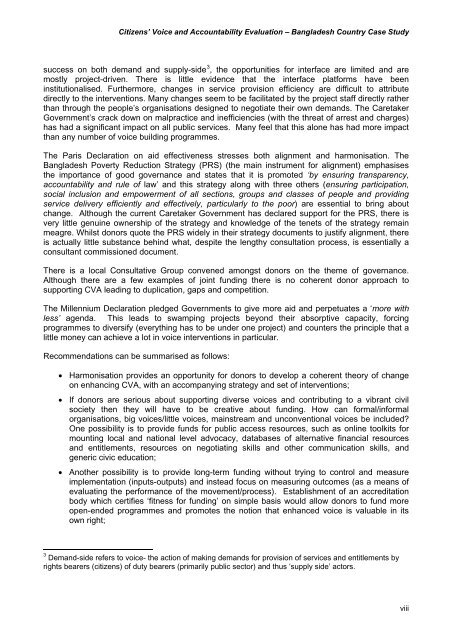Bangladesh - Belgium
Bangladesh - Belgium
Bangladesh - Belgium
You also want an ePaper? Increase the reach of your titles
YUMPU automatically turns print PDFs into web optimized ePapers that Google loves.
Citizens’ Voice and Accountability Evaluation – <strong>Bangladesh</strong> Country Case Study<br />
success on both demand and supply-side 3 , the opportunities for interface are limited and are<br />
mostly project-driven. There is little evidence that the interface platforms have been<br />
institutionalised. Furthermore, changes in service provision efficiency are difficult to attribute<br />
directly to the interventions. Many changes seem to be facilitated by the project staff directly rather<br />
than through the people’s organisations designed to negotiate their own demands. The Caretaker<br />
Government’s crack down on malpractice and inefficiencies (with the threat of arrest and charges)<br />
has had a significant impact on all public services. Many feel that this alone has had more impact<br />
than any number of voice building programmes.<br />
The Paris Declaration on aid effectiveness stresses both alignment and harmonisation. The<br />
<strong>Bangladesh</strong> Poverty Reduction Strategy (PRS) (the main instrument for alignment) emphasises<br />
the importance of good governance and states that it is promoted ‘by ensuring transparency,<br />
accountability and rule of law’ and this strategy along with three others (ensuring participation,<br />
social inclusion and empowerment of all sections, groups and classes of people and providing<br />
service delivery efficiently and effectively, particularly to the poor) are essential to bring about<br />
change. Although the current Caretaker Government has declared support for the PRS, there is<br />
very little genuine ownership of the strategy and knowledge of the tenets of the strategy remain<br />
meagre. Whilst donors quote the PRS widely in their strategy documents to justify alignment, there<br />
is actually little substance behind what, despite the lengthy consultation process, is essentially a<br />
consultant commissioned document.<br />
There is a local Consultative Group convened amongst donors on the theme of governance.<br />
Although there are a few examples of joint funding there is no coherent donor approach to<br />
supporting CVA leading to duplication, gaps and competition.<br />
The Millennium Declaration pledged Governments to give more aid and perpetuates a ‘more with<br />
less’ agenda. This leads to swamping projects beyond their absorptive capacity, forcing<br />
programmes to diversify (everything has to be under one project) and counters the principle that a<br />
little money can achieve a lot in voice interventions in particular.<br />
Recommendations can be summarised as follows:<br />
• Harmonisation provides an opportunity for donors to develop a coherent theory of change<br />
on enhancing CVA, with an accompanying strategy and set of interventions;<br />
• If donors are serious about supporting diverse voices and contributing to a vibrant civil<br />
society then they will have to be creative about funding. How can formal/informal<br />
organisations, big voices/little voices, mainstream and unconventional voices be included?<br />
One possibility is to provide funds for public access resources, such as online toolkits for<br />
mounting local and national level advocacy, databases of alternative financial resources<br />
and entitlements, resources on negotiating skills and other communication skills, and<br />
generic civic education;<br />
• Another possibility is to provide long-term funding without trying to control and measure<br />
implementation (inputs-outputs) and instead focus on measuring outcomes (as a means of<br />
evaluating the performance of the movement/process). Establishment of an accreditation<br />
body which certifies ‘fitness for funding’ on simple basis would allow donors to fund more<br />
open-ended programmes and promotes the notion that enhanced voice is valuable in its<br />
own right;<br />
3 Demand-side refers to voice- the action of making demands for provision of services and entitlements by<br />
rights bearers (citizens) of duty bearers (primarily public sector) and thus ‘supply side’ actors.<br />
viii

















